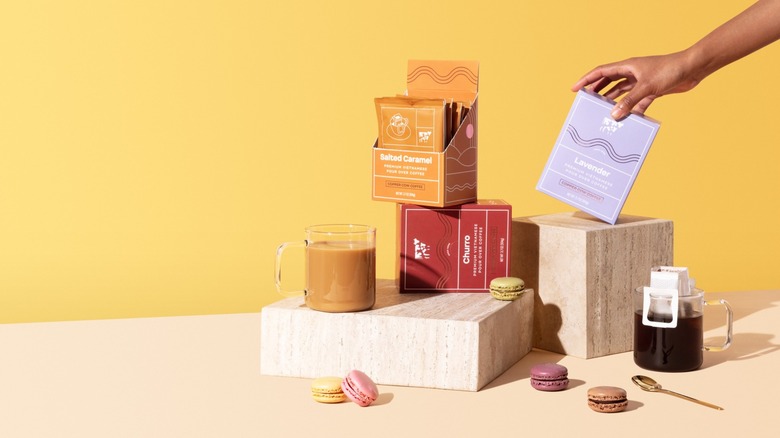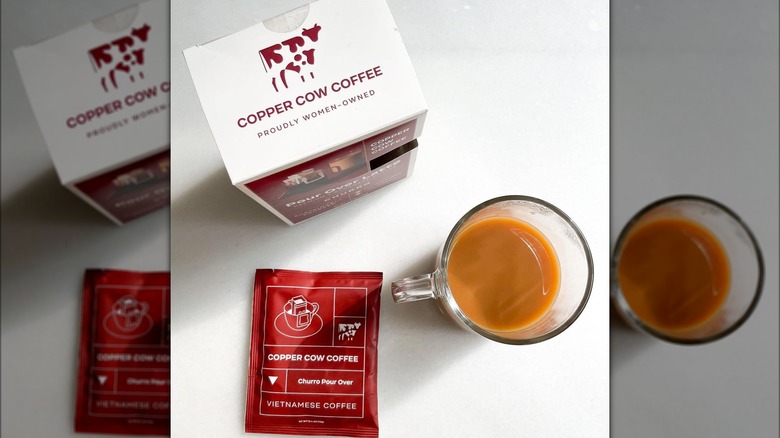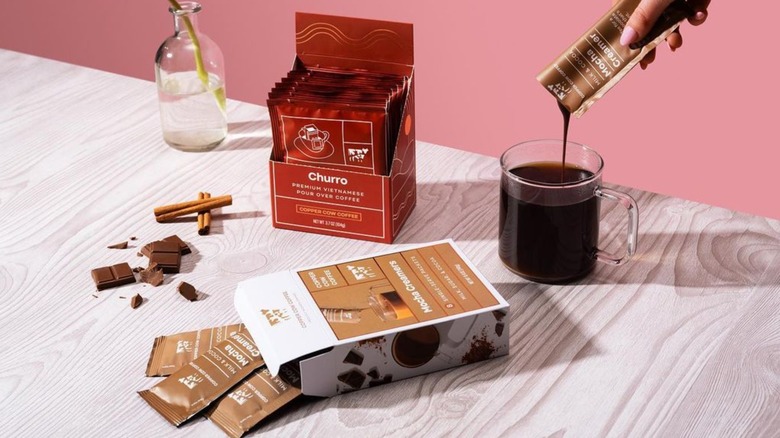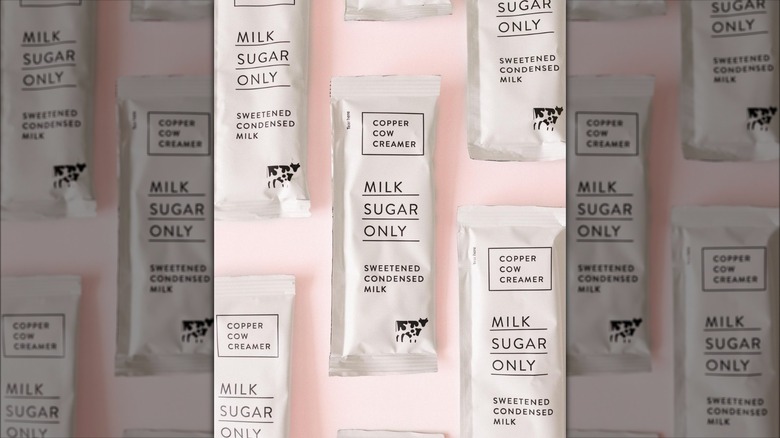Copper Cow Coffee: Here's What Happened After Shark Tank
Before the COVID-19 pandemic put a stop to morning coffee runs at neighborhood cafes and home coffee brewing methods like single-serve drip bags burst into popularity, Debbie Wei Mullin walked into "Shark Tank" with a pour-over coffee business that seemed to be ahead of the curve: Copper Cow Coffee. Rather than packing plain ol' coffee grounds in drip bags to brew classic black coffees, Copper Cow Coffee's signatures were its Vietnamese coffees that came with sachets of sweetened condensed milk creamers.
Born and raised in a Vietnamese household in California, Mullin fell in love with Vietnamese food, culture, and, more importantly, Vietnamese coffee, thanks to her mother. Sensing a business opportunity in introducing Vietnamese coffee — a strong and black drip coffee traditionally brewed with a filter known as phin and sweetened with condensed milk — to the U.S. outside of specialty coffee shops, Mullin's initial plan was to sell bottled Vietnamese cold brews that already had condensed milk in them.
While logistical issues put a damper on the ready-to-drink cold brew plans, a trip to Asia inspired the entrepreneur to look toward the pour-over method to turn Vietnamese coffee into an easy-to-brew form that wouldn't require any additional equipment to make at home. And so, with a $100,000 capital in donation from friends and family, Mullin launched Copper Cow Coffee. This Vietnamese coffee brand was already making millions of dollars worth of sales when it appeared on Season 12, Episode 25 of "Shark Tank" in 2021.
What happened to Copper Cow Coffee on Shark Tank?
Inspired by technology already common in Japan, Copper Cow Coffee claimed to be the first to bring single-use pour-over coffee bags to the U.S. In 2017, Copper Cow won the innovation award at the Fancy Food Show, which got its premium pour-over Vietnamese coffee bags into a thousand stores, bringing in $170,000 worth of sales in that year alone. Sales spiked to $500,000 in 2018, $1.6 million the year after, and $2 million to date in 2020 — bringing Copper Cow's lifetime sales to four million.
Although impressed by the crafty concept, the sharks found it hard to justify the $600,000 investment in exchange for 4% of equity in the business, especially considering the string of losses and high valuation that the company reported. Daymond John couldn't grasp the fact that Copper Cow had lost as much as $1.4 million the year before — and was on track to lose $700,000 the year of its appearance on the show — despite a 70% profit margin.
Kevin O'Leary was shocked by the company's $15 million valuation considering it was yet to make a profit, and Mullin's 40% ownership made him skeptical about the entrepreneur's control (or lack thereof) over the business. Mark Cuban wasn't convinced whether the demand for Copper Cow Coffee was organic or induced by temporary trends either. In the end, Mullin accepted the only offer that was on the table: a $600,000 investment from Robert Herjavec in exchange for an 8% stake in her business.
Copper Cow Coffee after Shark Tank
Although Mullin shook hands with Herjavec on the show, the entrepreneur later decided not to go through with the deal. Despite the offer not coming to fruition, "Shark Tank" did have other positive effects on Copper Cow Coffee: the Vietnamese coffee businesses found new customers thanks to the publicity and exposure from the show.
Initially, 90% of Copper Cow Coffee's revenue came from wholesale orders placed by the likes of Williams Sonoma, and half of that revenue came from department stores. As the pandemic shut department stores and changed their revenue model — and exposure from "Shark Tank" brought more direct customers — Copper Cow Coffee saw a spike in e-commerce orders, reducing wholesale revenue to 20%.
Mullin also found other ways to raise capital for her company. Before its appearance on the show, Copper Cow Coffee had already raised investments over two separate funding rounds: $2 million in 2018 and another $1.5 million from the same investors at a $15 million evaluation at a later date. After the show, Copper Cow Coffee raised another $8.5 million in Series A funding co-led by Cultivian Sandbox and Arborview Capital in 2021 — a far cry from the $600,000 she sought on "Shark Tank." Since its inception in 2017, Copper Cow has raised a total of $11.5 million over six funding rounds and has 12 investors on board at present — including Social Starts — though sadly, none are sharks.
Copper Cow Coffee is still in business
Not only is Copper Cow Coffee still in business, but considering the $8.5 million that the company raised only two years ago, it is very much steamrolling ahead with its plans to become the leader of brew-at-home Vietnamese coffees in the U.S. Besides glowing reviews from the likes of Forbes, Buzzfeed, and The New York Times for its flavors and packaging design, Copper Cow Coffee has partnered with retail giants like Costco, Whole Foods, Target, Walmart, Sprouts, and Thrive Market to puts its Vietnamese coffees in over 2,000 retail stores across the U.S. Copper Cow's coffees are also available in small retail stores across the country and the company partners with hotels to put its single-serve pour over coffees inside hotel rooms as well.
Retail stores aside, Copper Cow's coffees can also be bought online through its website, and the company frequently partners with other businesses to host giveaways on Instagram for its 83,000 followers. The company's retail and online presence aren't the only things that have grown since "Shark Tank," however — the company has also grown from a team of six employees to 15. Plus, Copper Cow has also helped its partners in Vietnam — from whom the company sources its coffees — to reduce the use of chemicals on their coffee plantations by 30% with the help of natural fertilizers like coffee cherries.
What's next for Copper Cow Coffee?
At the time of Copper Cow's appearance on "Shark Tank" in 2021, its products included pour-over Vietnamese coffee bags in classic as well as lavender, mint, rose, coconut, and churro flavors. Copper Cow has since switched some of the flavors up, swapping rose and coconut for salted caramel and vanilla while still keeping the Just Black variety of plain black pour-over coffee bags.
In a 2021 podcast with Modern Retail, Mullin said that her focus was on growing Copper Cow's SKUs and experimenting with different flavors and products. Not only did Copper Cow add more flavors to its existing pour-over coffees, but its products have also expanded to include flavored ground coffees and Vietnamese-style latte kits that come with their flavored pour-over coffee bags as well as flavored condensed milk creamers. In fact, Copper Cow also dabbles in tea now, with chai tea latte tea drops that can be dissolved in hot water and mixed with its creamers.
If the expansion of products is any indication, fans can expect more flavors in Copper Cow's Vietnamese coffees in the future or new products altogether. In the past, the brand has come out with limited-edition early grey and pumpkin spice-flavored Vietnamese coffees as well as matcha tea lattes and milk tea coffee lattes. The company also keeps its fans updated about the expansion of its coffees in retail stores (the latest one being Target) through Instagram, which means Mullin likely plans to take Copper Cow's Vietnamese-style drinks to even more national stores in the future.





